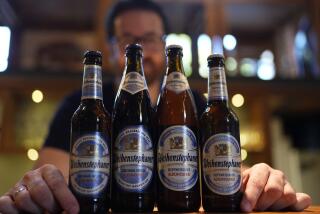Manure Clouds Brewing Plans of Belgian Monks
- Share via
ROCHEFORT, Belgium — Of all the complex mixtures of yeast, malt, sugar and hops that produce great beers, something as seemingly simple as water tops the ingredient list of Trappistes Rochefort.
“Water is just like all the other ingredients--only more important,” Dom Jacques Emmanuel of the Notre Dame de Saint Remy abbey says matter-of-factly, keeping his hands tucked deep inside his brown-and-beige frock.
The abbey is one of only a half-dozen monasteries where monks still follow the centuries-old Trappist tradition of beer-making, and its strong, dusky brews are hailed by connoisseurs as some of the world’s best.
For the abbey, hidden between the ancient woods and hunchback hills of southern Belgium’s Ardennes, sparkling spring water from a nearby plateau was a given for almost 800 years.
“It has great purity; it’s harmonious. Nature has simply done a splendid job,” says Dom Jacques Emmanuel, who runs the abbey and its brewery.
But the water of the Tridaine spring is under threat. As farming has gone industrial, the enemy of Rochefort’s Trappist beers has become manure.
Inside the lab at the abbey’s labyrinthine brewery, chemical engineer Gumer Santos stands over tiny vials of water being tested by a “photometer” for excess nitrates. “We need protection,” he says.
Low levels of nitrates contribute to the dark, malty beer’s fame and silky-smooth texture. An increase would threaten that, as well as upset the delicate yeast preparations.
Manure brims with nitrates.
Trouble Brewing Just up the Road
Two events have conspired to force the monks of the Cistercian Order of Strict Obedience, the formal name of the Trappists, to shed their customary reclusiveness and make their complaints heard.
First, a nearby chicken farm wants to expand, and because “more chickens means more manure,” it would create a source of pollution close to the Tridaine spring, Dom Jacques Emmanuel says.
The second threat may be more elusive, but also more political. The many farms on the plateau that feed the spring may be used as a dumping ground for surplus manure.
Over the past generation, Belgium’s Flanders region in the north has become one of the world’s most intensive industrial farming areas, and over the past decade it has been running out of land to spread its manure.
Wallonia in the south, with its stunning vistas of rolling hills and dense woods, is not farmed nearly as intensively and it has become a repository for Flemish manure, much of it dumped illegally by farmers evading environmental controls.
“There are not enough checks, there is not enough legislation and the fines are smaller than the profit,” Dom Jacques Emmanuel says with a sigh.
“More and more springs and lakes in Belgium are being contaminated,” he says.
Belgium Lags Rest of Europe
International studies support his claim that Belgium is one of the worst examples in the European Union when it comes to environmental protection.
The abbot and the local authorities in the nearby town of Marche-en-Famenne have ordered a study into the geological composition of the plateau. They want to find out which parts of the plateau feed directly into the spring so they can be better protected from pollution.
Every year, the abbey sells 568 gallons of its Trappist ale, even though demand, and production capacity, could easily double or triple that.
Producing more is not the monks’ higher calling, Dom Jacques Emmanuel says. But the last thing they want is for their great beer to be tainted.
It’s a concern shared by beer lovers around the world, who give the abbey’s brews top marks.
“Big, sweet and fruity, like ripe plum that melds with a spiciness that brings English Christmas pudding drizzled with rum to mind,” says a review of the abbey’s Rochefort 10 at www.beeradvocate.com.
“Beer like this gives us a reason to live.”
More to Read
Eat your way across L.A.
Get our weekly Tasting Notes newsletter for reviews, news and more.
You may occasionally receive promotional content from the Los Angeles Times.










